May 20, 2025 | 15:22 GMT +7
May 20, 2025 | 15:22 GMT +7
Hotline: 0913.378.918
May 20, 2025 | 15:22 GMT +7
Hotline: 0913.378.918
Introduced by Tay Ninh province Department of Agriculture and Rural Development, we visited the safe chicken farm belonging to Ms. Nguyen Thi Hanh in Thai Binh commune, Chau Thanh district. This is one of the largest and most modern farms owned by farmers in the locality.
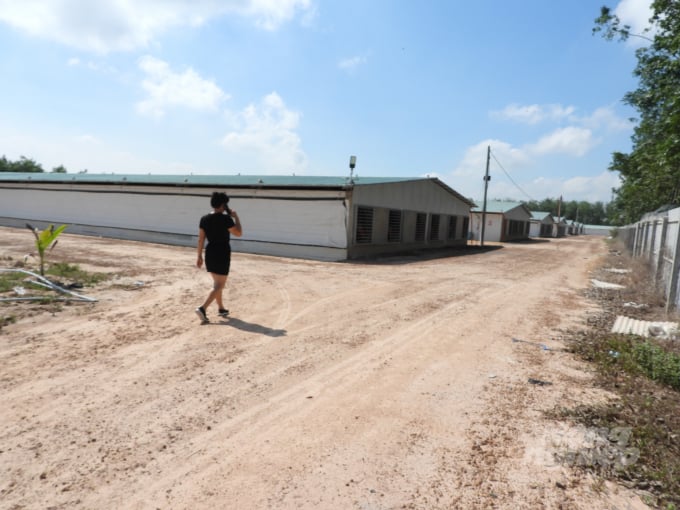
Nguyen Thi Hanh's chicken farm in Thai Binh commune, Chau Thanh district. Photo: Tran Trung.
Entering the breeding area, we were overwhelmed by the scientific design with an enclosed circulating breeding process, thorough waste treatment to help the farm gets rid of bad odor. The farm is equipped with many modern equipment such as automatic feeders, cooling systems, heaters, generators, electric lighting systems, etc.
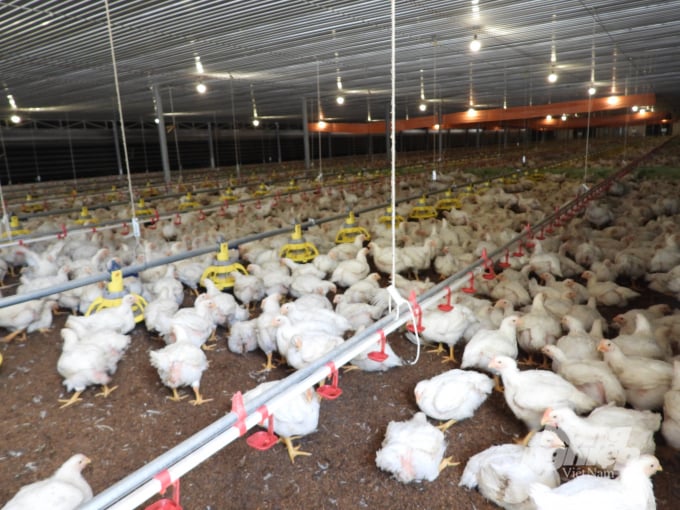
The breeding area is a "resort" for chickens. Photo: Tran Trung.
Ms. Hanh said, with the family tradition of raising free-range chickens, before 2014 she owned a large local colored-feather chicken farm with a scale of over 10,000 chickens. However, at that time, the output mainly depended on the traditional market, she had to focus on raising livestock as well as worry about the product consumption market, so selling efficiency was not high. In addition, the outbreak of avian flu made raising poultries difficult, at one point she was forced to suspend the barn and preserve capital.
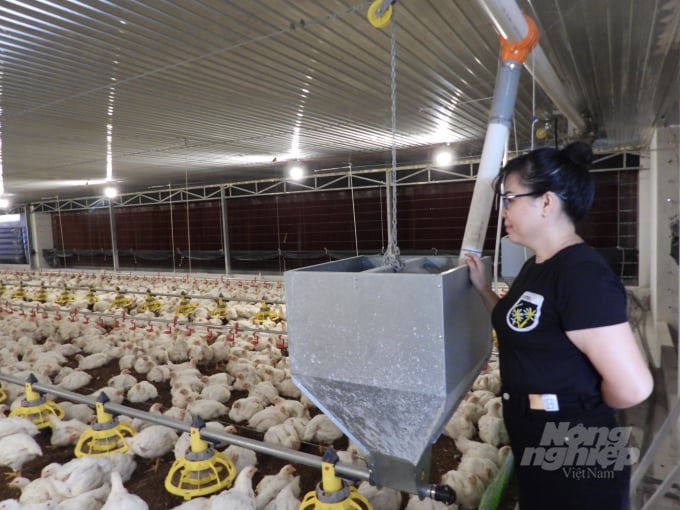
Fully automatic feeding system contributes to saving feed, reducing labor, increasing profit. Photo: Tran Trung.
After countless nights of pondering, with the determination to pass down the family's chicken raising profession, she researched on the method of raising livestock after studying several times at many farms inside and outside the province. She found that white feathered chickens have a short breeding period, high productivity with good meat quality. If raised in an enclosed environment, the disease can be completely overcome. Particularly, this type of chicken participates in an association chain with businesses, the output of which is consumed entirely, so farmers only have to focus on the production stage. At the beginning of 2020, Ms. Hanh decided to invest in a farming system of 200,000 white feathered chickens in the form of linking from seeds to products with a large foreign breeding company.
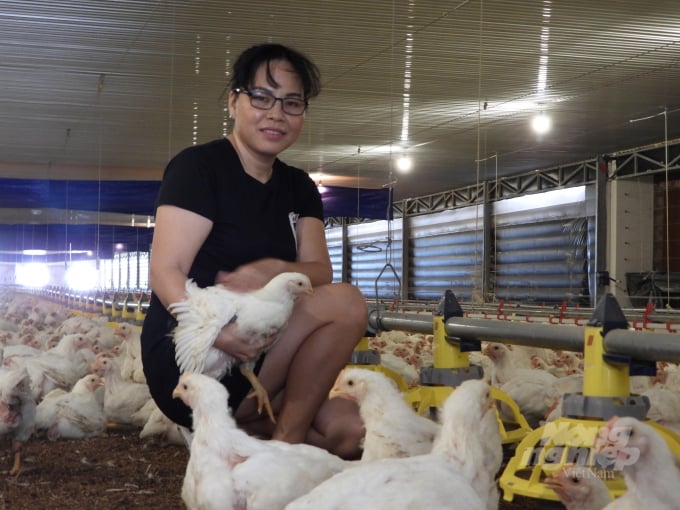
According to Ms. Hanh, white feathered chickens have a short breeding period, high yield with good meat quality. If raised in an enclosed environment, diseases can be completely overcome. Photo: Tran Trung.
According to Ms. Hanh, the first litter, after only 40-45 days, was released from the hen house, with an average weight of 3.5kg/head, some even weighing up to 5kg. Despite being affected by the Covid-19 pandemic, all chickens on the farm are purchased by the company with an average price of 30,000 VND/kg, after costs, bringing billions of VND in profit to the family.
Talking about the process of building a property as it is today, Ms. Hanh shared, when linking with the company, the farm is greatly supported, farmers only needed to have an area, capital and put in effort. Accordingly, the breeding stock and animal feed are provided by the company; when the chickens are ready, they are purchased by the company. Every week, the company sends staff to check on the growth of the chickens and provide technical guidance on care for the best development.
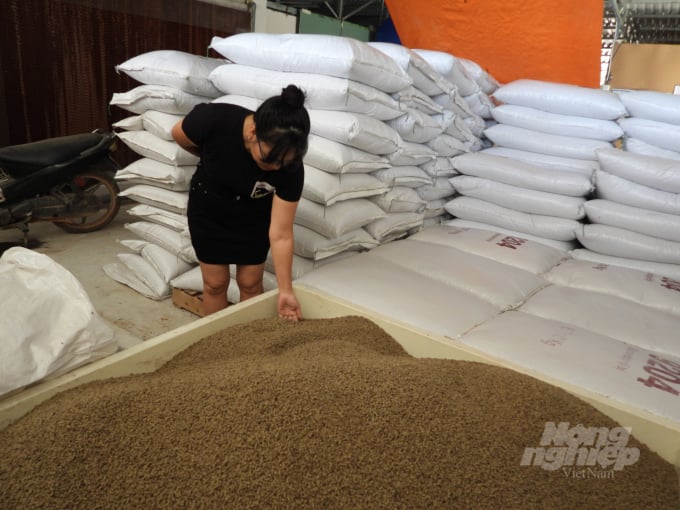
When linking with the company, the farm is greatly supported, farmers only needed to have an area, capital and put in effort. Photo: Tran Trung.
However, with the desire to make clean products, reduce costs and optimize efficiency, she constantly researches and applies new scientific, technical advances to production. The most significant of which is the use of probiotics to replace antibiotics.

The biological product mixing area is planned separately to ensure disease safety. Photo: Tran Trung.
According to Ms. Hanh, with the scale of raising up to thousands of animals, just a small negligence can lead to extremely serious consequences. On the contrary, just a small change can bring about huge effects. Accordingly, for the application of probiotics in production, in order to have good yeast, she directly contacts and imports yeast from partners in countries with advanced animal husbandry. After testing, she put it into mass use.
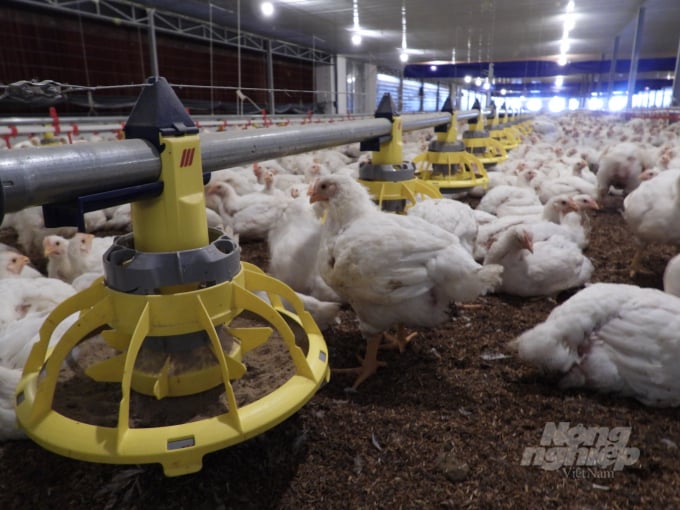
Thanks to the application of probiotics, in addition to yielding clean products meeting the needs of consumers, it also helps to reduce production costs. Photo: Tran Trung.
“Thanks to the application of probiotics, in addition to yielding clean products meeting the needs of consumers, it also helps to reduce production costs, the chickens can still grow and develop well with very low loss rate. On average, each chicken/litter costs about 3,000 VND in probiotics, saving over 30% compared to using antibiotics. In addition, loss is reduced by more than 1%, if the total herd of 200,000 heads like the farm, each litter will yield an additional 2,000 heads, bringing a lot more income", Ms. Hanh said.
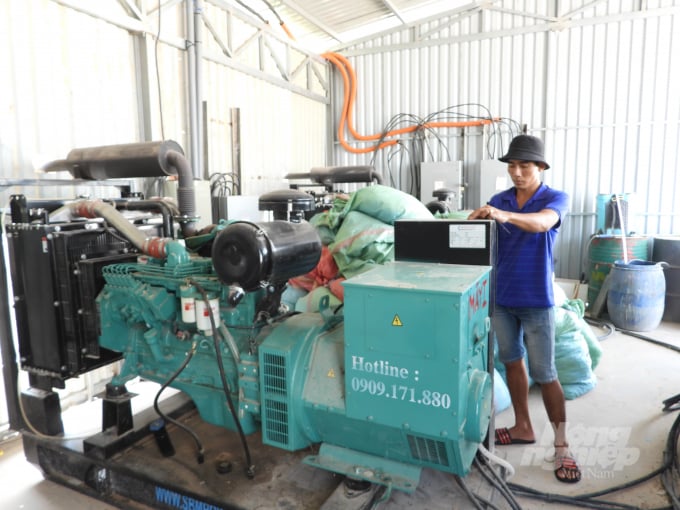
The generator system is equipped to maintain stable production and livestock activities. Photo: Tran Trung.
In addition, as soon as the barn is constructed, Ms. Hanh also applied biological padding to livestock to deal with environmental pollution. According to Ms. Hanh, the cost to make biological padding in livestock is low, but efficiency is very high. The beneficial microorganisms in the composition used as a biological padding will decompose the organic substances in the chicken's waste, especially the substances that cause odors. Therefore, ever since using biological padding, she no longer has to clean the barn, contributing to limiting pollution in livestock. In addition, biological paddings can limit some common diseases for pets such as diarrhea, cough, asthma, diseases caused by parasites, etc.
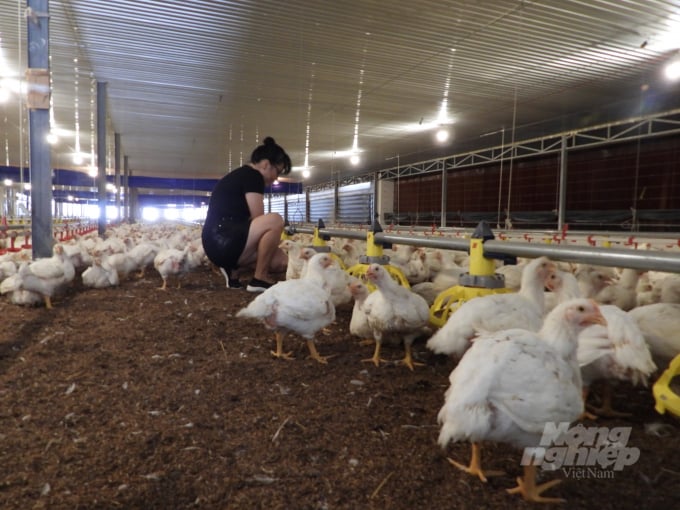
Poultry structure in the direction of shifting from small-scale livestock production to concentrated breeding, ensuring biosecurity is being focused on by Tay Ninh. Photo: Tran Trung.
According to Tay Ninh province Department of Agriculture and Rural Development, most chicken farms in the province apply enclosed cages with self-flowing drinking water troughs and automatic food supply, ventilation fans and use of biological byproducts to reduce environmental pollution.
Restructuring the poultry herd in the direction of shifting from small-scale breeding to concentrated breeding, ensuring biosecurity, the locality has currently established 76 farms, 541 livestock farms with the proportion of farm-raised chickens reaching 85.3% of the total chicken flock; 54 VietGAP chicken production facilities/disease-free certified, accounting for 45% of the total chicken flock.
Mr. Nguyen Dinh Xuan - Director of Tay Ninh province Department of Agriculture and Rural Development said that in order to develop chicken raising according to the value chain, the province has strengthened the management of breeds. Promote cooperation with institutes, schools and businesses in research and selection of local chicken breeds, crossbreed typical local purebreds with good disease resistance and high yield. The province strives to bring local breed chickens into breeding, accounting for 90%-95% of the total flock by 2030.
At the same time, continue to effectively implement activities and support concentrated livestock production and disease safety in the direction of VietGAP. Support the formation and replication of cooperative models linking livestock - processing - consumption of free-range chicken; support branding, packaging, food safety certification, meeting the increasing demands by the market. Simplify procedures, reduce related costs and create favorable conditions for businesses in terms of business registration procedures, project appraisal, issuance of investment, location agreement and land allocation license... to attract businesses to invest in the livestock sector and particularly chicken farming.
Translated by Nguyen Hai Long

(VAN) Khanh Hoa is investing over 545 billion VND to develop 240 hectares of high-tech marine aquaculture in order to guarantee a consistent supply of seafood exports and achieve the USD 1 billion target.

(VAN) Minister of Agriculture and Environment Do Duc Duy held a meeting with Soopakij Chearavanont, Chairman of C.P. Group, on May 15.
/2025/05/16/3800-0-nongnghiep-143756.jpg)
(VAN) Suntory PepsiCo Vietnam coordinated with the Ministry of Education and Training to implement an education program on water conservation, reaching nearly 1 million primary school students nationwide.

(VAN) Vietnam’s TH Group officially put its high-tech fresh milk processing plant into operation in the Russian Federation, marking a historic moment as the first TH true MILK cartons were produced in Russia.

(VAN) Use of high-quality broodstock and biotechnology is regarded as the most effective approach to ensuring sustainable and economically viable shrimp aquaculture ahead of climate change and the emergence of increasingly intricate disease patterns.

(VAN) Carbon farming is a form of agricultural practices that helps absorb more greenhouse gases than it emits, through smart management of soil, crops, and livestock.

(VAN) This is a key content of the Memorandum of Understanding recently signed between the Vietnam Fisheries Society and Kunihiro Inc of Japan.